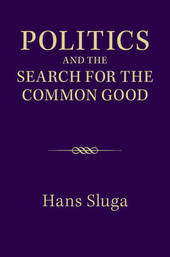
|
Politics and the Search for the Common Good
Paperback / softback
Main Details
| Title |
Politics and the Search for the Common Good
|
| Authors and Contributors |
By (author) Hans Sluga
|
| Physical Properties |
| Format:Paperback / softback | | Pages:272 | | Dimensions(mm): Height 227,Width 151 |
|
| Category/Genre | Social and political philosophy |
|---|
| ISBN/Barcode |
9781107671133
|
| Classifications | Dewey:320.01 |
|---|
| Audience | | Professional & Vocational | |
|---|
| Illustrations |
2 Tables, black and white; 3 Line drawings, unspecified
|
|
Publishing Details |
| Publisher |
Cambridge University Press
|
| Imprint |
Cambridge University Press
|
| Publication Date |
23 October 2014 |
| Publication Country |
United Kingdom
|
Description
Rethinking politics in a new vocabulary, Hans Sluga challenges the firmly held assumption that there exists a single common good which politics is meant to realize. He argues that politics is not a natural but a historical phenomenon, and not a single thing but a multiplicity of political forms and values only loosely related. He contrasts two traditions in political philosophy: a 'normative theorizing' that extends from Plato to John Rawls and a newer 'diagnostic practice' that emerged with Marx and Nietzsche and has found its three most prominent twentieth-century practitioners in Carl Schmitt, Hannah Arendt, and Michel Foucault. He then examines the sources of diagnostic political thinking, analyzes its achievements, and offers a critical assessment of its limitations. His important book will be of interest to a wide range of upper-level students and scholars in political philosophy, political theory, and the history of ideas.
Author Biography
Hans Sluga is William and Trudy Ausfahl Professor of Philosophy at the University of California, Berkeley. His publications include Gottlob Frege (1980), Heidegger's Crisis, Philosophy and Politics in Nazi Germany (1994) and Wittgenstein (2011). He is also the editor of The Philosophy of Frege (1993) and the co-editor of The Cambridge Companion to Wittgenstein (with David Stern, Cambridge, 1996).
Reviews'The current standing of politics and politicians is low, citizens are disaffected and disengaged, and much writing on politics is empty and abstract. In this important new study Hans Sluga reflects on the nature of politics, and how we might reach a better understanding of it as 'the care of the common'. It is a compelling read.' Andrew Gamble, University of Cambridge
|